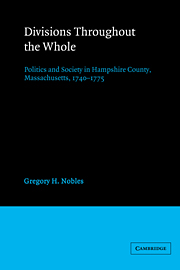Book contents
- Frontmatter
- Contents
- Preface
- Introduction
- 1 Family power and political relations in Hampshire County
- 2 The Hampshire County ministry and the Great Awakening: from revival to reaction
- 3 The revivalist removed
- 4 The legacy of religious dissent
- 5 New settlements in an unsettled society
- 6 The politics of parochialism
- 7 Revolution in the neighborhood
- Appendix
- Notes
- Bibliographical essay
- Index
4 - The legacy of religious dissent
Published online by Cambridge University Press: 30 September 2009
- Frontmatter
- Contents
- Preface
- Introduction
- 1 Family power and political relations in Hampshire County
- 2 The Hampshire County ministry and the Great Awakening: from revival to reaction
- 3 The revivalist removed
- 4 The legacy of religious dissent
- 5 New settlements in an unsettled society
- 6 The politics of parochialism
- 7 Revolution in the neighborhood
- Appendix
- Notes
- Bibliographical essay
- Index
Summary
After Edwards and Billing had been dismissed from their churches, the ministers of the Hampshire Association may have hoped to enjoy the future years in peace, free from divisive debate over doctrine. The churches of Northampton and Cold Spring had both found suitable replacements for their departed ministers, and neither John Hooker at Northampton nor Justus Forward at Cold Spring could be considered at all friendly to evangelical or enthusiastic religion or to stringent standards for church admission. Likewise, during the 1750s, a number of other congregations in the county apparently decided to settle for a little less religious excitement, and they filled vacancies in their pulpits with orthodox, well-trained young men, many of whom were openly opposed to Edwards and the principles he had lately espoused. At West Springfield, for instance, Edwards's former supporter Samuel Hopkins died in 1755 and was succeeded by Joseph Lathrop, who had lived and studied for two years with Robert Breck after graduating from Yale. And at Hadley, a younger Samuel Hopkins, son of the West Springfield minister, took over the pulpit when Chester Williams died, but the new minister must have seemed almost as dead as the old; his preaching style was, according to later accounts, “dull and languid.” Moreover, even though he was Jonathan Edwards's nephew, he was reputed to be “in opposition to some of the distinctive points in the system of his uncle,” and there was certainly little of the revivalist about him.
- Type
- Chapter
- Information
- Divisions throughout the WholePolitics and Society in Hampshire County, Massachusetts, 1740–1775, pp. 75 - 106Publisher: Cambridge University PressPrint publication year: 1983

